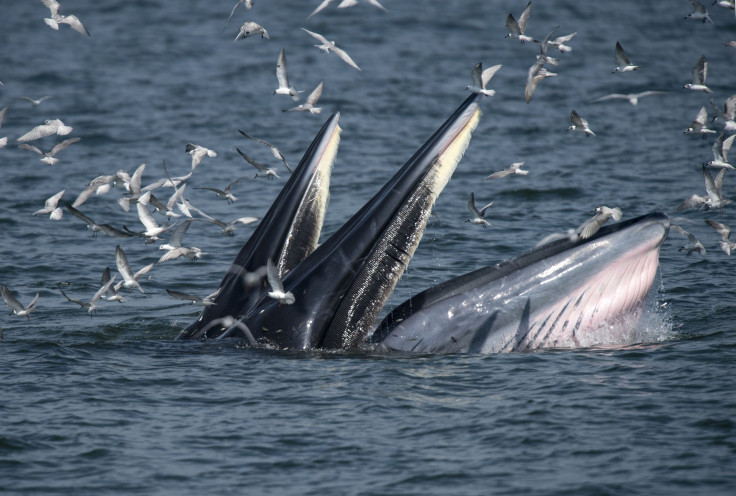Supposedly New, Strange Whale Feeding Behavior Traced Back To Ancient, Medieval Texts [Video]
KEY POINTS
- The strange feeding behavior was only observed in recent years
- Descriptions of sea creature behavior in ancient texts are strikingly similar to it
- This shows the value of ancient material in scientific inquiry, the researchers said
There's a particularly mysterious whale-feeding behavior that was only discovered relatively recently. It appears that the behavior has been captivating humans for a long time, however, as it may be behind the stories about ancient sea creatures.
It was only in the 2000s when researchers first observed a rather strange feeding behavior among whales, researchers wrote in their new study, which was published Tuesday in Marine Mammal Science.
The behavior is called "trap feeding" or "tread-water feeding," during which the whales simply stay motionless with their jaws open at a right angle at the surface of the water instead of lunging at the fish to catch them. As they stay motionless in the water, the fish swim to their mouths and end up getting trapped when the whales shut their mouths.
The video below shows just how fascinating the behavior is.
The previously unknown strategy was observed in two whale species at different parts of the planet, the researchers said. Why exactly it was only observed relatively recently is unclear, Flinders University noted in a release, citing the possibility that it may be because of "changing environmental conditions" or simply that the creatures are being more closely watched today, thanks to modern technology.
But how new is this behavior to human eyes, really? In their study, the researchers described "striking parallels" between the supposedly novel behavior in ancient and medieval sources. In particular, the similarities are said to be the most striking with an Old Norse description of a creature called the "hafgufa."
"(T)he big fish keeps its mouth open for a time, no more or less wide than a large sound or fjord, and unknowing and unheeding, the fish rush in in their numbers. And when its belly and mouth are full, [the hafgufa] closes its mouth, thus catching and hiding inside it all the prey that had come seeking food," the mid-13th-century Old Norse text Konungs skuggsjá (the King's Mirror) reads.
Indeed, the description certainly sounds like the recently observed behavior, with the hafgufa being described as a type of whale. The earliest apparent account of the behavior was in the Physiologus, which dates back to almost two millennia, study authors John McCarthy, Erin Sebo and Matthew Firth of Flinders University noted in a piece on The Conversation.
In the ancient text, the description of a whale called the aspidochelone is also strikingly similar to the modern trap feeding in that when the creature's mouth is already full of fish, "he suddenly closes his mouth and swallows them."
Taken together, it's possible, then, that the feeding strategies aren't exactly new but something that has existed for a long time.
"The possibility of a link between the hafgufa/aspidochelone tradition and trap or tread-water feeding cannot be easily dismissed," the authors wrote. "Definitive proof for the origins of myths is exceedingly rare and often impossible, but the parallels here are far more striking and persistent than any previous suggestions."
As for why the behavior hadn't been observed prior to 2011, one of the possibilities is, unfortunately, the much lower whale numbers today compared to ancient times due to the "devastating" impact of whaling, the researchers noted in The Conversation.
Overall, this shows the value of looking at ancient material in modern scientific inquiry and that, even though the people then didn't have the modern devices that scientists use today, their observations of natural phenomena can certainly be valuable and accurate, the researchers said.
"It's exciting because the question of how long whales have used this technique is key to understanding a range of behavioral and even evolutionary questions," Sebo said in the Flinders University release. "Marine biologists had assumed there was no way of recovering this data but, using medieval manuscripts, we've been able to answer some of their questions."

© Copyright IBTimes 2024. All rights reserved.






















